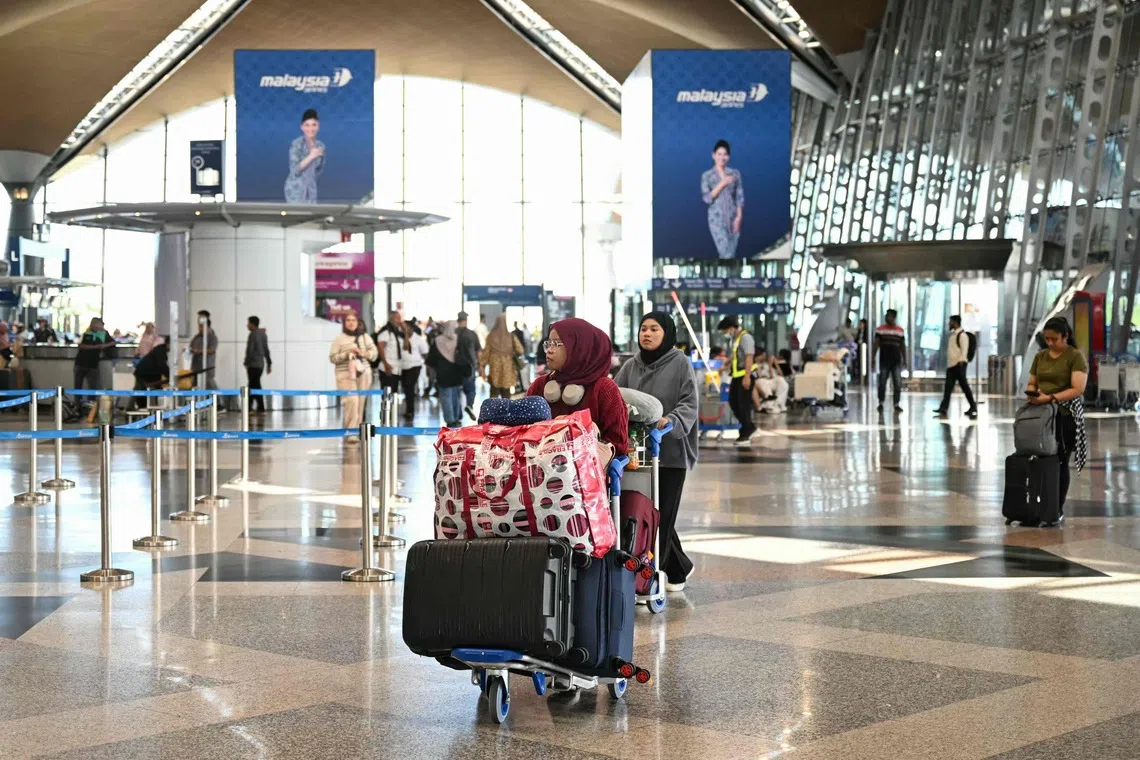Malaysia to roll out new system to track visitors, including airline passenger information screening
Sign up now: Get insights on the biggest stories in Malaysia

Malaysia has developed a foreign digital identity system to reduce human intervention during screenings at its entry points and curb corruption.
PHOTO: AFP
KUALA LUMPUR – A foreign digital identity (FDID) system comprising fingerprints, iris scans and facial recognition data of foreign visitors is set to be introduced, says Malaysia’s Home Ministry.
The ministry said the FDID will serve as the sole digital identity for foreign visitors and will be integrated with the centralised biometrics system.
“Each visitor will have a unique official record, making it difficult to falsify or manipulate. This system also allows the entry and exit of foreign nationals to be tracked effectively,” the ministry said in a written parliamentary reply on Oct 8.
The FDID is among the technological advancements that have been and are being developed by the ministry to reduce human intervention during screenings at Malaysia’s entry points.
This comes on the back of various arrests made in connection with counter-setting activities at Malaysia’s borders.
Counter setting refers to the practice of foreigners entering the country without proper documents through designated and pre-determined lanes at entry points.
It was recently revealed that 18 of the 27 individuals detained by graft busters for alleged involvement in counter setting were Malaysian Border Control and Protection Agency (AKPS) officers.
The ministry added that a system aimed at screening airline passenger information up to 72 hours before departure is scheduled to be implemented in October.
It said the Advance Passenger Screening System (APSS) will be rolled out in phases and will initially involve 10 airlines operating in Malaysia. The system will later be expanded comprehensively across more airlines in 2026.
According to the ministry, high-risk individuals can be detected through the APSS risk evaluation engine even before they board flights in their country of origin. They will then undergo tighter screening upon arrival in Malaysia.
“This system will function as an efficient and first layer of border control,” the ministry said.
It added that a Risk Assessment Engine (RAE) is being developed as a solution within the National Integrated Immigration System
“Here, data collected through the APSS will be scientifically and transparently analysed by the National Integrated Command Centre in Putrajaya, Sabah and Sarawak, which will begin operating this month,” the ministry said.
“Through the RAE system, any decision on the entry of a visitor will no longer depend on human discretion but on a smart and consistent analysis instead,” it said, adding that this was important to curb misuse of power or corruption at the country’s entry points.
The use of auto-gate machines will also be expanded as the primary defence against counter-setting activities, the ministry said. Currently, visitors from 63 countries can use the auto-gate system, alongside long-term pass holders.
Beginning in October, the auto-gate system will be expanded to all main entry points and will gradually extend to cover the nation’s borders. It will also be fully used for all visitors exiting the country.
“If a visitor is found to have overstayed, have an arrest warrant or (have been) blacklisted, the auto-gate system will immediately halt the exit and the visitor will be referred to the Immigration Department office for further action,” the ministry said.
“This approach removes any opportunity to ‘negotiate’ or illegitimately resolve the issue with officers at immigration counters.”
Another measure, the ministry said, is mandating the use of body-worn cameras by all AKPS officers on duty.
“Counters will also be monitored through smart closed-circuit television systems,” it added.
The ministry was responding to Datuk Seri Ronald Kiandee, the MP for Beluran, who asked about measures taken to overcome counter-setting issues at Immigration Department counters, apart from charging the perpetrators in court. THE STAR/ASIA NEWS NETWORK


